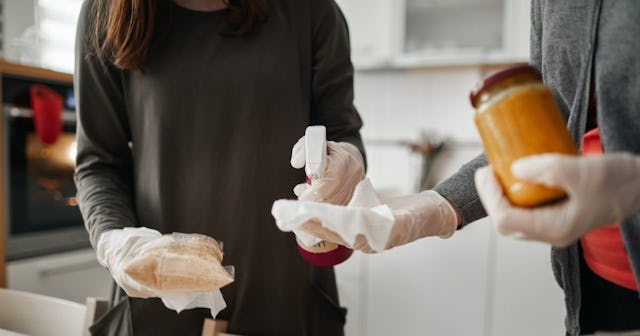The FDA Says There Is No Evidence Of Coronavirus Being Transmitted Through Food Or Packaging

Ever since December 2019, when the first reports of COVID-19 started trickling out of Wuhan, China, we are learning more about the highly infectious and deadly disease. Therefore, the rules and recommendations surrounding everything from prevention methods to how to treat it, are constantly changing. Take, for example, everything involving food and grocery shopping. For the last few months, many of us have been diligent about cleaning and disinfecting our food and packages after getting our groceries at the store or via delivery.
RELATED: These Shopping Cart Covers Keep Baby Comfy & Clean At The Grocery Store
While recent studies have suggested that COVID-19 can live on certain surfaces anywhere between hours or days, the FDA attempted to calm the nerves of Americans by pointing out that nobody, to their knowledge, has contracted the virus via food or food packaging.
“We want to reassure consumers that there is currently no evidence of human or animal food or food packaging being associated with transmission of the coronavirus that causes COVID-19,” they wrote on their website Thursday. “This particular coronavirus causes respiratory illness and is spread from person-to-person, unlike foodborne gastrointestinal or GI viruses, such as norovirus and hepatitis A that often make people ill through contaminated food.”
While “there is no evidence of food packaging being associated with the transmission of COVID-19,” they add that “if you wish, you can wipe down product packaging and allow it to air dry, as an extra precaution.”
They also made it clear that there is no need to worry about a nationwide food shortage, despite the fact that your local store may be out of high demand products.
So how should you approach grocery shopping, according to the FDA? They offered several tips — most of which you are probably already doing — to “help protect yourself, grocery store workers, and other shoppers.”
The first? Prepare a shopping list in advance. “Buy just 1 to 2 weeks worth of groceries at a time. Buying more than you need can create unnecessary demand and temporary shortages,” they explain.
When you go to the store, make sure to wear a face-covering or mask. “Some stores and localities may require it. Check your state, county or city guidelines for any other requirements.” Also, try and bring your own wipes or use those provided by the store to wipe down your shopping cart handles or basket. If you are bringing reusable bags for your groceries, make sure you clean or wash them between every use.
And, like you are hopefully doing at all times, make sure to practice social distancing while shopping — “keeping at least 6 feet between you, other shoppers, and store employees.” And, keep your hands away from your face.
Finally, after leaving the store and returning home, make sure to wash your hands with warm water and soap “for at least 20 seconds.” Then, repeat the process again after putting away your groceries.
They made sure to end the article on a happy note. “Food is a source of comfort, as well as nourishment for you and your family — especially now — and we hope this advice will help you continue to buy groceries with care and confidence.”
This article was originally published on